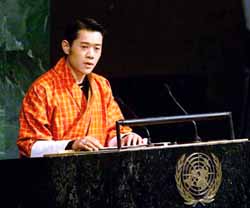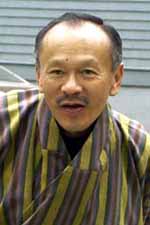The Kingdom of Happiness: Bhutan's Altruistic Economics
By Gar Smith / The-Edge
May 3, 2006

Delusion, greed and hatred are the common enemies.
-- The Buddha
Not everything that can be counted counts.
And not everything that counts can be counted.
-- Albert Einstein
 |
Bhutan's young Druk Gyalpo (Dragon King) Jigme Singye Wangchuk
Credit: UN Environment Programme |
When Bhutan's young king, King Jigme Singye Wangchuck, ascended the throne in 1972, he not only rejected the Western economic model, he came up with something better. The kingdom of Bhutan became the first country in the world to measure its wellbeing by Gross National Happiness (GNH) instead of Gross National Product (GNP).
The GNH concept was an inspired attempt to place Buddhist principles at the heart of government policy. Never before had a modern state attempted to integrate altruism and spiritual precepts into an economic system. By creating the GNH concept, Bhutan posed a question that needed to be asked: Should a nation's success be measured only by its ability to produce and consume? Or should it be based on the quality-of-life and the level of happiness enjoyed by its people?
Instead of promising his people globalized jobs, fast cars and HDTV sets, King Wangchuck devoted himself to protecting his country's heritage, culture and environment. He promised to keep 60 percent of the country covered with native forests. Today, 72 percent of Bhutan remains forested and, as one off the country's former Prime Ministers happily boasts: "Our country is now greener than at any time in living memory." Bhutan also has set aside 26 percent of its territory as wildlife sanctuaries.
King Wangchuck wasn't an absolutist, however. While he banned satellite dishes, he still enjoyed playing basketball and driving his Toyota. But when he heard growing complaints that the lucrative tourist trade was degrading the local environment and despoiling sacred sites, he acted. The King limited the number of tourists allowed to visit each year and required each visitors to pay $200 per day.
Under the standards of GNH, technological progress is never pursued at the expense of human life and humanitys soul. Mental and psychological wealth remain core concerns in this country where happiness is considered more important than material wealth.
Sander Tideman, the author of Gross National Happiness: Towards Buddhist Economics, notes that, in the West, economic calculations ignore the value of things such as fresh water, green forests, clean air, traditional ways of life. In GNP economies, revenue from clearcutting forests is counted as a plus -- while the loss of the forests, wildlife habitat and watersheds is ignored. The GNP places production and consumption measures in a "plus" column but doesn't provide a "loss" column for the resulting waste, pollution and destruction of finite resources.
The Western economic model also ignores the value of the "Compassionate Economy" of unpaid volunteers who care for families, the disabled, the ill and the destitute. Some studies estimate that volunteer social work represents 50 percent of all productive labor in Western societies.
In Buddhism, happiness is not determined by what one owns, but by what one knows; by one's living skills and imagination. Happiness is not achieved by having, but by being. Instead of conquering through competition, GNH promotes mutual advancement by advancing through compassion and co-operation.
The GNH concept has managed to influence the World Bank (whose Wealth Index now includes standards for "human capital" and "environmental capital"), the UN Human Development Index (which lists education, human rights and life expectancy as "assets"), and a growing number of for-profit companies whose shareholders have insisted that annual reports include "social responsibility" statements.
GNH has even begun to make inroads in other countries. Nova Scotia has introduced GNH standards and, last summer, the Second International Conference on GNH was convened in Canada.
 |
| His Excellency Lyonpo Jigmi Thinley, Bhutan's Minister for Home and Cultural Affairs |
Gross National Happiness Comes to Berkeley
On January 24, His Excellency Lyonpo Jigmi Thinley, Bhutan's Minister for Home and Cultural Affairs, joined a panel discussion on happiness at the International House at the UC Berkeley campus. Fellow panelist Robert B. Reich, former Labor Secretary in the Clinton administration, happily welcomed Thinley to "the bluest part of the bluest city in a Blue State."
His Excellency Thinley began by praising "our Philosopher King" for honoring Buddhist culture. He recalled a mandate from the year 1675 that proclaimed the "happiness of all and teachings [of Buddhism are] mutually dependent." Bhutan now boasts a Happiness Law supported by the King's Four Pillars of Happiness
Happiness, Thinley said, "is the end purpose of life for every individual, every society." Unfortunately, he noted, most countries are "moving further and further away from the possibility of finding happiness in life." Thinley, who served twice as Bhutan's Prime Minister, insists "what we need is a more caring and compassionate society
Materialistic, industrial societies are afflicted with crime, alcoholism, violence, depression, disease and mental illness. "How many communities are truly committed to equity, to sustainability?" The Center for Bhutan Studies hopes to develop a series of Happiness Indicies by 2007.
Panel moderator Dr. Alan Wallace, Ph.D., the president of the Santa Barbara Institute for Consciousness Studies observed that supposedly sophisticated Westerners still persist in applying a "Hunter-gatherer approach to happiness" that is guided by the hedonic question: "What can I find or buy to make me happy?" According to Wallace, the alternative is the "cultivator" metaphor. "Cultivators don't roam widely," he explained. "They grow collectively, cooperatively and effectively."
Panelist Paul Ekman, PhD., an Emeritus Professor of Psychology at UC San Francisco, presented a fascinating lexicon of happiness, beginning with the Italian word "Fiero" (which expresses the pleasure of stretching on reaching a goal). And then there is "Naches," the Jewish word for the pleasure one feels at the success of one's children. And the Indian word "Sukha" meaning "joy, relish, happiness, and comfort" (as reflected in the seated Sukhasana pose, one of the most comfortable asana postures for yoga practitioners). And, finally, "Schadenfreude," the twisted pleasure one finds in observing the misfortune of others.
Dr. Clifford Saron, Ph.D, Assistant Research Scientist at the Center for Mind and Brain at UC Davis decreed happiness to be "the Default State." He drew inspiration from a surprising source: a Young & Rubicam ad campaign for Eastern Airlines, whose slogan read: "The real vacation is inside!" Saron's poetic and moving presentation ended with a projected image of the human brain morphing into the root and branch structure of a tree.
It was Reich who brought the discussion back to earth with his sober conclusion. "Our Constitution guarantees the pursuit of happiness," he noted, "not the actual attainment of it." Having observed it from the inside, Reich insisted that the goal of the US system is "not one of social justice." The US economy is ruled by what Reich calls "Market Fundamentalism -- the idea that the Market knows best." That is why, he explained, there was "not a peep of protest" about the Ford motor company's massive layoffs, Wal-Mart's paltry $13,000 yearly wages that force employees to find health care at the expense of local taxpayers.
"Our democracy is very week," Reich confessed. "Capitalism is very strong
Capitalism is winning; democracy is loosing. Our democracy is corrupt. It is being undermined." What are the prospects for introducing GNH in America? Reich was not optimistic. "We cannot begin to think about Gross National Happiness until we reclaim our democracy," he declared. And the problem is endemic on America's university campuses. UC teaches ambitious advancement, Reich observed, but it does not dwell "on the tools of compassion."
Refugee Issue Poses Problems for Bhutan
Bhutan is now preparing for the transition from a Constitutional Monarchy to a Parliamentary Democracy. Elections are set for July, when the King will abdicate. "But this is not a fixed end," says Thinley, since, for the interim, the prince will take the throne.
But Bhutan faces threats to the survival of its democracy and its GNH that are beyond its control. Four days before Thinley addressed SF's Commonwealth Club, a global team of 1,300 scientists released a report warning that Western-based consumption and lifestyle trends would lead to famine, epidemics and environmental collapse by 2050.
It is predicted that climate change will lead to the death of Bhutan's glaciers within the next 30-40 years. These projections "are terrifying," Thinley admits, since the glaciers provide drinking water for 2.5 million people on both sides of the Himalayas. If the US continues to ignore the changing climate, he fears his country "could eventually become a barren desert."
And there is another problem that is even more immediate. Outside Berkeley's International House, a phalanx of placard-waving protestors had gathered to draw attention to the plight of thousands of Bhutanese languishing in refugee camps in Nepal.
When King Wangchuck came to throne in 1974, he initially followed a national integration policy established by his father King Jigme Dorji Wangchuck. The new king hailed Bhutan as "a bird of two wings soaring into the sky" -- referring to the Lhotsampas, Bhutan's ethnic Nepali minority, as one of the "two wings." But this changed in 1985 when Wangchuck introduced the "One Nation, One People" policy and implemented the Citizens' Act.
The UN reports that 105,000 refugees fled Bhutan after the passage of the Act. Under the new policy, Lhotsampas inside Bhutan claim that their lands have been confiscated, their language banned from schools, their textbooks burned in public, and their children "selectively denied citizenship and education."
When a speaker asked His Excellency to address the question of the displaced Lhotsampas, Thinley seemed uncomfortable. He initially avoided answering the question, repeatedly stating that: "Only 8 percent of Bhutan's land in arable. There are 25 million people in Nepal but only half a million in Bhutan."
Asked whether Bhutan's population could be permitted to grow without destroying the GNH, Thinley suggested that, in order to preserve Bhutan's GNH, it would be necessary to cap the country's population at 1.5 million -- "as long as most of the population continues to work in agriculture." Ironically, it was the attainment of better health and increased longevity that triggered the unprecedented population growth inside Bhutan. "We would like to be a little above the population replacement rate," Thinley concluded.
"We welcome the recent steps taken by His Majesty the king towards democratic reforms," said one of the protestors, Ganesh Subedi, a Bhutanese exile living in Alameda. But Subedi is concerned that "the Lhotsampas are excluded in drafting of the country's first constitution.
"What does this GNH mean to over 100,000 Bhutanese living in exile?" Subedi asks. "How can there be GNH when one-sixth of the country's population is in exile demanding safe return to their home country?"
"We also strongly urge the international community to persuade the Royal Government .... to return the refugees to their homesteads."
For more information contact:







